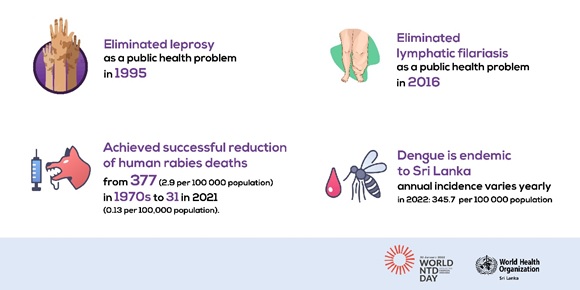World Neglected Tropical Diseases (NTDs) Day is celebrated globally on 30 January and provides an opportunity to highlight neglected tropical diseases and call for increased momentum to end the suffering caused by NTDs. The theme of this year’s Day ‘Act now. Act together. Invest in neglected tropical diseases’ urges countries to scale up efforts to confront inequalities, keep NTD services accessible through innovation and put an end to these diseases which can be prevented.
Neglected tropical diseases (NTDs) are a diverse group of 20 conditions that are widespread in the world’s poorest regions, where water safety, sanitation, and access to health care are substandard. They are caused mostly by a variety of pathogens including viruses, bacteria, fungi, protozoa, and parasitic worms. NTDs affect over 1 billion people globally and are responsible for thousands of preventable deaths every year. NTDs are ‘neglected’ because they are almost absent from the global health agenda and are plagued by a lack of resources and funding. These conditions disproportionately affect the world’s poorest and most marginalized populations, including children, women, and the elderly.
WHO’s NTD Road Map for 2021-2030 sets out ambitious targets for tackling the challenge posed by NTDs and fosters innovation in critical areas such as diagnostics, drugs and vaccines. 47 countries have eliminated at least one NTD by the end of 2022 and accelerating actions towards combating NTDs is imperative to ensuring progress toward universal health coverage. This World NTD Day, WHO calls on countries to stay committed to delivering on the road map and ensuring quality NTD services to affected groups.
Status of NTDs in Sri Lanka
Dengue, Leishmaniasis, Leprosy, Lymphatic filariasis (LF), Rabies, Snake bite envenoming, soil-transmitted helminthiasis (STH) are some of the key NTDs still present in the country.

Sri Lanka eliminated leprosy as a public health problem in 1995 through 100% geographical coverage of multidrug therapy and a widespread social marketing and social mobilization campaign to reduce leprosy incidence. However, recent statistics point to a rising trend in leprosy prevalence which needs to be addressed for the country to maintain elimination status.
The country has also made significant progress in Lymphatic Filariasis control and received WHO Certification for the Elimination of Lymphatic Filariasis as a public health problem in 2016. Key strategies instrumental to the achievement of this milestone include intensification of mosquito control efforts and parasitological surveillance, improved access to health services, mass drug administration and improved health education to address stigma. Sri Lanka continues to maintain large-scale post-validation surveillance to provide additional evidence to confirm the elimination of transmission of the disease.
Sri Lanka was one of the first countries in Asia to prioritize rabies control and has significantly brought down the disease burden through enhanced multisectoral actions under a “One Health” approach. Anti-rabies mass dog vaccination, rabies Post-Exposure Treatment, and extensive public awareness campaigns are some of the key pillars of Sri Lanka’s success. WHO guided the development of a five-year National Strategic Plan (NSP) in 2022 and disease control strategies have been re-oriented in line with the NSP including the adoption of Integrated Bite Case Management (IBCM), and the promotion of responsible pet ownership to eliminate rabies from Sri Lanka.
Dengue continues to pose a significant disease burden in the country with high disease transmission during two seasonal outbreaks of the disease coinciding with the monsoon seasons. The Government’s 'National Action Plan for Prevention and Control of Dengue in Sri Lanka 2019-2023', developed with WHO technical and financial support, highlights the importance of strong surveillance, enhanced intersectoral coordination, evidence-based clinical management, and integrated vector management as key strategies to achieve set targets.
Sri Lanka has made remarkable progress in the past decade in addressing the suffering caused by NTDs in the country. However, to sustain and scale up actions against NTDs, the country will need to invest targeted attention and financial resources. Strong political commitment, dedicated support from partners, cross-sectoral approaches in ensuring access to medicines for those affected, and combating associated stigma and discrimination are all key approaches to be accelerated across all NTD interventions to achieve the 2030 Global NTD Roadmap Targets. Increasing community awareness of the importance of engaging in prevention, control, elimination, and eradication activities and seeking early treatment is imperative to ensuring that no one is left behind.
“We know that success is possible as demonstrated in Sri Lanka’s historic elimination of lymphatic filariasis and leprosy as public health problems,” said Dr Alaka Singh, WHO Representative to Sri Lanka, “We now need to sustain our achievements and accelerate progress to achieve the last mile in the elimination of NTDs. WHO stands committed to supporting Sri Lanka to transform neglect into action, end the suffering caused by poverty-related diseases and achieve Health for All.”
Acknowledgements
National Dengue Control Unit
Anti-Filaria Unit
Anti Leprosy Unit
Public Health Veterinary Services
Key related resources
World Neglected Tropical Diseases Day Campaign: https://www.who.int/campaigns/world-ntd-day
Neglected tropical diseases factsheet: https://www.who.int/health-topics/neglected-tropical-diseases#tab=tab_1.
